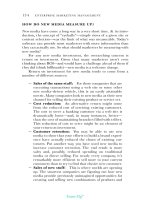Virus of the Mind: The New Science of the Meme
Bạn đang xem bản rút gọn của tài liệu. Xem và tải ngay bản đầy đủ của tài liệu tại đây (1.86 MB, 511 trang )
Praise for Virus of the Mind
“Brodie is infectious, indeed, but his virus breeds
truth. Those who ingest this book are at great
risk of seeing how things really are.”
— Douglas Rushkoff, the author of Media Virus!
and Nothing Sacred
“This isn’t a book—it’s a mental adventure.
Virus of the Mind stimulates, educates, and
awakens you to what really happens to the things
you see and hear. Buy it and study it.”
— Jeffrey Gitomer, the author of The Sales Bible
“The true earmark of genius is taking a complex
concept and making it simple (for people like me)
to understand and, far more importantly, utilize.
If the meme truly is fundamental to behavior
(child imitates child, child imitates adult, world
leader imitates world leader . . . ), then all of us
need to spread memes with much greater
intention—and care! Brodie’s humor makes this
book a fun, absorbing, educational, and at times
controversial read. Pick up this book, then give it
to someone you love and you will spread a truly
valuable Virus!”
— Kevin Hogan, Psy.D., the co-author of
Irresistible Attraction and author of The
Psychology of Persuasion
“Virus of the Mind can do for memetics what
Carl Sagan has done for astronomy and
astrophysics with Cosmos. ”
— Elan Moritz, Ph.D., director of the Institute for
Memetic Research
VIRUS
OF THE
MIND
Also by Richard Brodie
Getting Past OK: A Straightforward Guide to
Having a Fantastic Life
Hay House Titles of Related Interest
YOU CAN HEAL YOUR LIFE, the movie,
starring Louise L. Hay & Friends (available as a
1-DVD program and an expanded 2-DVD set)
Watch the trailer at: www.LouiseHayMovie.com
the shift: the movie, starring Wayne W. Dyer
(available as a 1-DVD program and an expanded
2-DVD set) Watch the trailer at:
www.DyerMovie.com
THE BIOLOGY OF BELIEF: Unleashing the
Power of Consciousness, Matter & Miracles, by
Bruce H. Lipton, Ph.D.
FRACTAL TIME: The Secret of 2012 and a
New World Age, by Gregg Braden
THE LAST DROPOUT: Stop the Epidemic! by
Bill Milliken
MIND PROGRAMMING: From Persuasion and
Brainwashing to Self-Help and Practical
Metaphysics, by Eldon Taylor (hardcover-with-
CD)
EXCUSES BEGONE!: How to Change
Lifelong, Self-Defeating Thinking Habits, by
Dr. Wayne W. Dyer
POWER vs. FORCE: The Hidden Determinants
of Human Behavior, by David R. Hawkins, M.D.,
Ph.D.
Please visit Hay House USA:
www.hayhouse.com®
Hay House Australia: www.hayhouse.com.au
Hay House UK: www.hayhouse.co.uk
Hay House South Africa: www.hayhouse.co.za
Hay House India: www.hayhouse.co.in
VIRUS
OF THE
MIND
The New Science of the Meme
Richard Brodie
Carlsbad, California • New York City
London • Sydney • Johannesburg
Vancouver • Hong Kong • New Delhi
Copyright © 1996 by Richard Brodie
Published and distributed in the United States by: Hay House,
Inc.: www.hay house.com • Published and distributed in
Australia by: Hay House Australia Pty. Ltd.:
www.hayhouse.com.au • Published and distributed in the United
Kingdom by: Hay House UK, Ltd.: www.hayhouse.co.uk •
Published and distributed in the Republic of South Africa by:
Hay House SA (Pty), Ltd.: www.hayhouse.co.za • Distributed in
Canada by: Raincoast: www.raincoast.com • Published in India
by: Hay House Publishers India: www.hayhouse.co.in
Editorial supervision: Jill Kramer • Design: Tricia Breidenthal
Indexer: Richard Comfort
All rights reserved. No part of this book may be reproduced by
any mechanical, photographic, or electronic process, or in the form
of a phonographic recording; nor may it be stored in a retrieval
system, transmitted, or otherwise be copied for public or private use
—other than for “fair use” as brief quotations embodied in articles
and reviews—without prior written permission of the publisher.
The author of this book does not dispense medical advice or
prescribe the use of any technique as a form of treatment for
physical, emotional, or medical problems without the advice of a
physician, either directly or indirectly. The intent of the author is only
to offer information of a general nature to help you in your quest for
emotional and spiritual well-being. In the event you use any of the
information in this book for yourself, which is your constitutional
right, the author and the publisher assume no responsibility for your
actions.
Previously published by Integral Press (ISBN: 0-9636001-2-5)
Library of Congress Cataloging-in-Publication Data
Brodie, Richard.
Virus of the mind : the new science of the meme / Richard
Brodie 1st ed.
p. cm.
Includes index.
Originally published: Seattle, Wash. : Integral Press, c1996.
ISBN 978-1-4019-2468-3 (hardcover : alk. paper) 1. Social
psychology. 2.
Genetic psychology. 3. Contagion (Social psychology) 4. Public
opinion. 5. Memetics. I. Title.
HM626.B76 2009
302 dc22
2008046359
ISBN: 978-1-4019-2468-3
12 11 10 09 4 3 2 1
1st Hay House edition, May 2009
Printed in the United States of America
For my mother,
Mary Ann Brodie,
who got me thinking . . .
CONTENTS
Introduction: Crisis of the Mind
Chapter 1: Memes
Chapter 2: Mind and Behavior
Chapter 3: Viruses
Chapter 4: Evolution
Chapter 5: The Evolution of Memes
Chapter 6: Sex: The Root of All Evolution
Chapter 7: Survival and Fear
Chapter 8: How We Get Programmed
Chapter 9: Cultural Viruses
Chapter 10: The Memetics of Religion
Chapter 11: Designer Viruses
(How to Start a Cult)
Chapter 12: Disinfection
Recommended Reading
Acknowledgments
About the Author
Warning: This book contains a live mind
virus. Do not read further unless you are
willing to be infected. The infection may
affect the way you think in subtle or not-
so-subtle ways—or even turn your current
worldview inside out.
INTRODUCTION
Crisis of the Mind
“ What a waste it is to lose one’s
mind or not to have a mind is very
wasteful.”
— Dan Quayle, mutating the memes in the United
Negro College Fund’s motto, “A mind is a terrible
thing to waste.”
There is some good news in this book. So before
I get into how mind viruses are spreading wildly
throughout the world—infecting people with
unwanted programming like the Michelangelo
computer virus infects computers with self-destruct
instructions—I’ll start with the good news. . . .
The good news is that the long-awaited
scientific theory unifying biology, psychology, and
cognitive science is here. An interdisciplinary
effort by scientists in all those fields over the last
20 years or so—really back to 1859 and Charles
Darwin, if you like—has produced a new science
called memetics.
The science of memetics is based on evolution.
Darwin’s theory of the evolution of species by
natural selection utterly transformed the field of
biology. Scientists are now applying modern
evolutionary theory to the way the mind works, the
way people learn and grow, and the way culture
progresses. In so doing, the field of psychology
will ultimately be as transformed by the scientists
researching memetics as biology was by Darwin.
For those of us who yearn to understand
ourselves, learning about memetics gives us a huge
amount of satisfaction. I also believe that people
who understand memetics will have an increasing
advantage in life, especially in preventing
themselves from being manipulated or taken
advantage of. If you better understand how your
mind works, you can better navigate through a
world of increasingly subtle manipulation.
Now the bad news. . . . The bad news is that this
book raises more questions than it answers. In
particular, memetics has uncovered the existence
of viruses of the mind but gives us few insights
into what to do about them.
Viruses of the mind have been with us throughout
history, but they are constantly evolving and
changing. They are infectious pieces of our culture
that spread rapidly throughout a population,
altering people’s thoughts and lives in their wake.
Mind viruses include everything from the
relatively harmless examples, such as miniskirts
and slang phrases, to those that seriously derail
people’s lives, such as the cycle of unwed mothers
on welfare, the Crips and Bloods youth gangs, and
the Branch Davidian religious cult. When these
pieces of culture are ones we like, there’s no
problem. However, just as the Michelangelo
computer virus programs computers with
instructions to destroy their data, viruses of the
mind can program us to think and behave in ways
that are destructive to our lives.
This is the most surprising and most profound
insight from the science of memetics: your thoughts
are not always your own original ideas. You catch
thoughts—you get infected with them, both directly
from other people and indirectly from viruses of
the mind. People don’t seem to like the idea that
they aren’t in control of their thoughts. The
reluctance of people to even consider this notion is
probably the main reason the scientific work done
so far is not better known. As we’ll see, ideas
people don’t like have a hard time catching on.
Further compounding the problem is that you
don’t immediately know whether the programming
you get from a given mind virus is harmful or
beneficial. Nobody ever joined a religious cult
with the intention of getting brainwashed, moving
to Guyana, and committing suicide. When the
teenage Bill Gates caught the poker-playing mind
virus at Harvard, was that harmful because it kept
him from his studies? Or was it beneficial because
it helped sway his decision to drop out, start
Microsoft, and become a multi-billionaire?
Paradigm Shift
Every so often, the world of science experiences
something called a paradigm shift. That happens
when one of the basic, underlying assumptions
we’ve been living with changes, such as when we
shifted from looking at the universe as revolving
around the earth to the earth revolving around the
sun. Another shift occurred when Einstein
discovered the relationships between space and
time and between energy and matter. Each of these
paradigm shifts took some time to penetrate the
scientific community and even longer to become
accepted by the general public.
Viruses of the mind, and the whole
science of memetics, represent a major
paradigm shift in the science of the mind.
Because understanding this new science
involves a significant change in the way people
think about the mind and culture, it has been
difficult for them to grasp. As with any paradigm
shift, memetics doesn’t fit into our existing way of
looking at things, of understanding the world.
The trick to learning a new paradigm is to set
aside your current one while you’re learning rather
than attempt to fit the new knowledge into your
existing model. It won’t fit! If you’re willing to set
aside your current thinking long enough to consider
four concepts, some or all of which may be new to
you, you’ll be rewarded with an understanding of
memetics. With that understanding, I hope, comes a
call to action for anyone concerned with the future
of human life.
— The first concept—the star of the show—is
the meme, which I introduce in Chapter 1 and
which plays a leading role throughout this book.
The meme, which rhymes with “beam,” is the basic
building block of culture in the same way the gene
is the basic building block of life. As I outline in
Chapter 2, memes are not only the building blocks
of culture on a large scale—making up countries,
languages, and religions—but also on a small
scale: memes are the building blocks of your mind,
the programming of your mental “computer.”
— Second is the concept of virus. It’s well
known that viruses exist in biology and in the
world of computers. Now we’ll see how they
show up in the world of mind and culture, the
world of memetics. In Chapter 3, I’ll draw
parallels between the three different universes that
viruses live in to show what we can expect from
mind viruses in the future.
— The third concept that contributes to this
paradigm shift is evolution. Evolution is one of
those words that many people use, thinking they are
talking about the same thing but really having
different ideas of what it is and means. I’ll discuss
scientists’ most current theory of evolution in
Chapter 4 and how it applies to memes in Chapter
5.
— The fourth concept necessary to
understanding mind viruses is the new science of
evolutionary psychology. This field examines the
biases and mechanisms of our minds that evolved
to support our survival and reproduction. Some of
these biases take the form of psychological buttons
that can be pushed to penetrate our mental
defenses. I called this part of the book “Crisis of
the Mind” rather than simply “Introduction”
because the former pushes more buttons: it attracts
more attention, and more people will read it. I
called this book Virus of the Mind rather than
Introduction to Memetics for the same reason.
Currently a controversial topic, evolutionary
psychology explores and explains many of the
stereotypical differences between men and women,
especially in the realm of mating behavior. Chapter
6 is about the mating part of evolutionary
psychology; Chapter 7 covers the survival aspect.
Memetics builds on these four conceptual blocks
to form a new paradigm of how culture evolved
and is evolving. It illuminates a major decision
point for humanity:
Will we allow natural selection to
evolve us randomly, without regard for our
happiness, satisfaction, or spirit? Or will
we seize the reins of our own evolution
and pick a direction for ourselves?
Memetics gives us the knowledge and power to
direct our own evolution more than we’ve done at
any time in history. Now that we have that power,
what will we do with it?
A Threat to Humanity
A mind virus is not spread by sneezing, like the
flu, or by sex, like AIDS. It’s not a physical thing.









